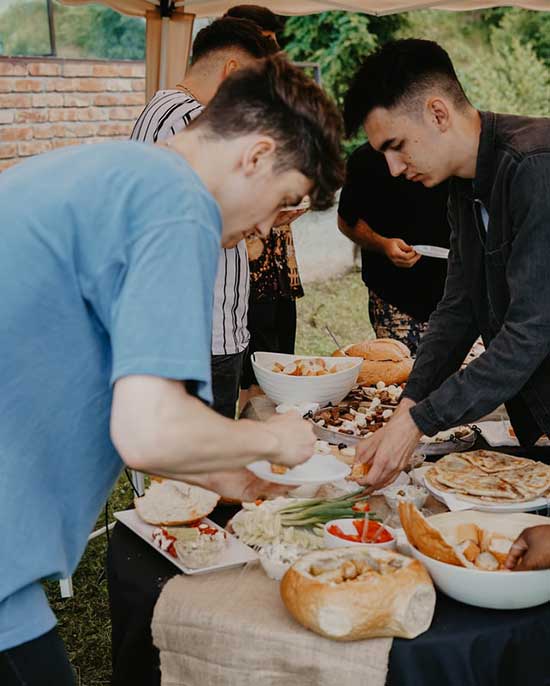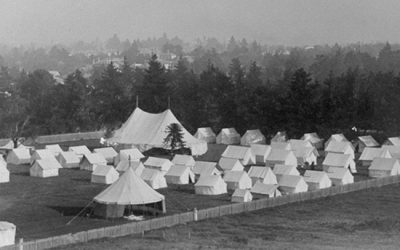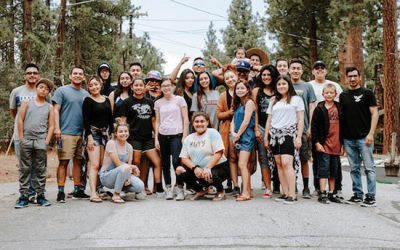Every so often, usually on a schedule ranging from once a week to once a month to once a quarter, an Adventist church will have “fellowship dinners,” often casually referred to as potlucks.
One of the best parts about getting together with a church family on Sabbath is the fellowship we can experience.
The word “fellowship” may not be used very often in everyday conversation, but it has special meaning in a church setting. It’s about spending quality time together with the intention of building and deepening friendships.
Adventists value fellowship as an integral part of their faith community. And what better way to help make that happen than bonding over food. Adventists often “break bread together” with a fellowship lunch!
During these potluck Sabbaths, families bring all kinds of different dishes, and we will all share a big meal together.
But let’s go through the details together:
- What exactly is church potluck?
- Who goes to a potluck dinner?
- Why do Adventist churches have it?
- How can I participate in a church potluck?
So if you’ve been invited to a potluck, want to go to a potluck, or just want to know what it’s all about, here’s what you’ll want to know.
What is church potluck?

Photo by Victoria Shes on Unsplash
Put simply, a church potluck is a meal gathering when individuals and families each bring a delicious dish for everyone to share.
You might see this potluck meal called “fellowship dinner” or “fellowship meal” on church signs or bulletins, or on their social media or website announcements.
Often, people bring their dishes in the morning before the church service, placing them in the kitchen or meal area. Then, after service is over, volunteers will set out the dishes on large serving tables, along with plates and utensils.
And because our congregations are often diverse and full of people from different cultures and ethnicities, the recipes and dishes often reflect that. It can be a real treat!
What else should you expect from an Adventist church potluck in terms of food?
Dishes are often vegetarian, to make them as inclusive as possible. Some might also bring vegan dishes to the shared meal.
It’s also normal to have many different types of dishes. Some people will bring a home cooked meal or a family recipe, some will bring dinner rolls, some will bring frozen lasagna to heat up in the church kitchen, some will bring salad or soup, and some will bring dessert (Yum!).
All of these are welcome and necessary! Variety and community are crucial parts of church potluck.
But food isn’t the only thing that makes church potluck special.
There are a lot of reasons churches host fellowship dinners, so let’s explore some of those reasons.
Why do churches have potluck?
Every church potluck is going to look different. Some congregations are small and might share potluck every week because they are so close-knit. Other congregations are larger and might only have potluck-style gatherings a few times a year. But whatever the size of the church, most Adventist churches have potluck for similar reasons:
Let’s talk about each of these.
To cultivate relationships

Photo by Toa Heftiba on Unsplash
Have you ever been in a situation where you see people repeatedly—say at a job or in a class—but you never really truly get to know them?
In fact, you might recognize their faces but not even know their names
Trust us, you’re not alone.
It’s easy to show up to a gathering, spectate, and then leave. Church can be the same way. Especially if we’re feeling more reflective than social.
Potluck is a means to remedy that!
Sharing food with one another ensures that we can slow down, sit down, and talk. Or even just be together, regardless of the depth of conversation.
Not only are we able to reconnect with people we haven’t spoken to in a while, but we are also able to connect with people we don’t know well or don’t know at all.
People might come to potluck physically hungry, but by the time they’re done eating and it’s time to go home, they’ll have been physically, emotionally, and spiritually fed.
Coming to potluck is an opportunity to feel that kind of fellowship and connection.
To follow Jesus’ example
The importance of gathering for a good meal comes from the example of Jesus and the early followers of Christianity.
Much of the gospels is filled with stories of Jesus sharing meals with people. All kinds of people: Pharisees, tax collectors, adulterers and adulteresses, even the disciple that would betray Him to the religious leaders, leading to Jesus’ crucifixion (Luke 7, 19, 22).
When we gather together for a meal, we have the opportunity to forget any differences and simply share food with each other.
After Jesus’ death, resurrection, and return to heaven, the early Christian church kept the tradition of sharing meals with each other. The book of Acts tells us that as the Church was growing, they continued “steadfastly in the apostle’s doctrine and fellowship, in the breaking of bread, and in prayers” (Acts 2:42, NKJV).
A growing church needs to grow in community! “Breaking bread” is one of the ways the early Christian church developed that kind of community.
When God’s people practice fellowship meals, we follow the example of Jesus and of the apostles of the early church.
To exhibit hospitality

Photo by Toa Heftiba on Unsplash
Potluck is a chance for an Adventist church to not only welcome people to a place of worship, but also to make people feel truly at home.
Spirituality and church can be sensitive topics. And for many, church could even be an uncomfortable place based on their past experiences.
By opening up church doors to share a meal with whoever would like to join, Adventists want to make church welcoming and comforting. No intimidation or gate-keeping.
And of course, there is nothing like a huge table of food to invite people to enjoy.
But you might be wondering, “I’ve never been in an Adventist church before. Can I still come to potluck?”
The answer is a resounding “yes!”
Let’s talk a bit more about who can come to church potluck.
Who goes to church potluck?
Anyone can come to church potluck! Even if you didn’t know it was happening or didn’t bring a dish. Seriously. Adventists desire to show hospitality, no matter the situation, whether it’s to families who are visiting from far away, former congregation members, or first-time church-comers.
Potluck is an event where people from all different walks of life come together. They have different backgrounds, incomes, opinions, traditions, education, and vocations.
And all are welcome. No one is turned away.
Adventist church potluck is also a great opportunity to provide a meal for those who are visiting, for those who are out-of-town guests, and for church members to fellowship with these guests and with one another.
The people are what make potluck special. Even more than all the great food (which is saying a lot, because there is usually a ton of good food).
And if you’re wondering how you can participate in a potluck, we’ve got you covered.
How can you participate in a church potluck?
A great way to find out when church potluck is happening in your area is to check out a local Adventist church. Check your preferred map app or yellow pages to see if there’s one close to you.
The church bulletin, a piece of paper you’ll probably receive upon arrival, usually lists church events, including potluck.
This will also give you a chance to ask the greeter what the potluck schedule is like, as different congregations have potluck at different times or different intervals.
You might also be able to look online at that church’s website for an online version of the bulletin or for a potluck schedule posted on their calendar.
Whatever works for you, know that you are always welcome at an Adventist church. Whether you’re coming for the church service, the potluck, or bringing your kids to Sabbath School, we’re glad to see you!
It’s not necessary to bring anything, and you don’t even need to already know someone or already know anything about Adventism.
If you want to know more about what it’s like to visit an Adventist church, check out our page that describes what Adventist church services are like.
Find a Church
If you’re interested in finding a local Adventist church near you, you can use the Adventist Locator provided by the General Conference of Seventh-day Adventists.
Related Articles
More Answers
Seventh-day Adventist World Population and Demographics
The Adventist Church has more than 22 million members and 100,000 churches worldwide, plus a large system of hospitals, schools, and publishing houses. Learn more about this diverse church.
What Is a Seventh-day Adventist Camp Meeting?
Although camp meetings didn’t begin with the Seventh-day Adventist Church, they’re as much an Adventist thing as haystacks.
Camp meeting is an extended event for Adventists (and non-Adventists) of all ages to gather and participate in spiritual seminars and activities. During the event, attendees often camp in tents, campers, or RVs.
How to Join the Seventh-day Adventist Church
Whether you heard about the Seventh-day Adventist Church through a traveling evangelist, during your online searches, or through a loved one or relative, you might be considering joining yourself.
How Do Adventists Do Baby Dedications?
For Christians, dedication ceremonies for babies, also for older children, are an important time for parents and the church. It’s a special part of the worship service when parents present their young children to God and the church family. Both parents, along with the congregation, regard this as a solemn promise to be a Christ-like example to the child.
Do Adventists Celebrate Communion and Foot Washing?
Like many Christian denominations, Adventists regularly participate in communion, also referred to as the “Lord’s Supper” or the “Last Supper.” They also practice foot washing (John 13:1-20), or the “ordinance of humility,” during the service—which isn’t as common.
What is the Concept of “Present Truth” and Why is it Important?
Present truth is the principle that certain biblical truths are relevant to God’s people at specific times in history. God sends the Holy Spirit to reveal truths that help us better understand how to interpret and apply His Word in a present moment.
Do Seventh-day Adventists Celebrate Easter
Yes, many Seventh-day Adventists do celebrate Easter.
Does the Adventist Church Have Youth Ministry Programs?
The Seventh-day Adventist Church has been organizing and operating youth ministry programs since 1879.
In our opinion, youth ministry is one of the most important ministries a church can have.
Do Adventists Celebrate Birthdays?
Yes, most Seventh-day Adventists do celebrate birthdays because we see them as excellent reminders of the life God has blessed us with. And we celebrate them the same way everyone else does—with friends, family, presents, and a special meal.
What Do Adventists Offer for Young Adults?
In recent years, the age group often classified as “young adults” has been trickier to engage. It’s been a significant concern for Christian churches around the world. Though interestingly enough, similar observations regarding young adults have been coming up in conversations about the economy, the entertainment industry, politics, and more.
Do I Need to be an Adventist to be Saved?
The answer to this question is simply, “no.”
When it comes to salvation in Jesus Christ, all that is required of a person is to acknowledge Jesus’ sacrifice for us, believe that He has saved us, and claim the free gift of salvation that is always available to us. Salvation is not based on denomination.
Do You Have to Be Vegetarian to Be Adventist?
Of course not. Membership in the Seventh-day Adventist Church has never included any dietary requirements. However, there might be some reasons people might think that. So many Adventists are vegetarians or even vegan, and a plant-based lifestyle has many health benefits.
All About Seventh-day Adventist Colporteurs
The Seventh-day Adventist Church uses a variety of methods to spread the hope of the gospel to the world. One of these ways is through colporteuring, also called “canvassing” or “literature evangelism.”
What Is an Adventist Book Center (ABC)?
When you walk into any one of the many Adventist Book Center (ABC) locations, chances are you’ll be greeted by pleasant gospel music in the background, friendly employees, and row after row of Christian books, movies, Bibles, study guides, kids’ games, and more.
Do Seventh-day Adventists Celebrate Holidays?
Wondering whether your Adventist classmate or coworker keeps the same holidays you do? Perhaps you want to include them in some festivities, but you also want to respect their beliefs. Thus, you’re unsure of how to navigate the holiday question. Will they accept your invitation to the office Christmas party?
The Adventist Haystack (It’s Not What You Think) + 4 Recipes
Haystacks are basically a taco salad—with an Adventist spin on it! Most versions are vegetarian and offer an endless combination of tasty toppings. We eat them often because they’re healthy, scrumptious, and easy to make.
Do Seventh-day Adventists Believe in Medical Care?
The Seventh-day Adventist Church believes in and supports evidence-based medical care. In fact, medicine has played a significant part in our history, and today we run a major health system with hospitals, medical schools, and clinics throughout the world.
All about Adventist Elementary Schools
The Seventh-day Adventist Church operates the largest Protestant education system in the world. A big part of this system is our K-8 elementary schools, or primary schools, as they’re known in other parts of the world.
What Are Pathfinder and Adventurer Clubs?
Like the boy or girl scouts, Pathfinders and Adventurers learn about nature and life skills. But what makes these clubs special is their purpose to bring young people closer to Jesus.
A Look at Adventist Colleges and Universities
On the outside, Seventh-day Adventist universities may not look much different than other college campuses. But the real differences are beneath the surface.
What Is ASI (Adventist-Laymen’s Services and Industries)?
ASI, which stands for Adventist-laymen’s Services and Industries, is a membership-based organization that provides support for Seventh-day Adventist laypeople (Adventist professionals who aren’t pastors).
What Are Adventist Evangelistic Meetings?
The Seventh-day Adventist Church puts a huge emphasis on sharing the gospel through evangelism, or sharing the gospel through preaching, teaching, and testimony. One of the ways we accomplish this is by organizing public events called evangelistic meetings.
Christian Summer Camps—A Cherished Adventist Ministry
School’s out, the sun’s shining, and your kids are thrilled to have the summer ahead of them. Then three days in, you hear, “I’m bored…”
Do Adventists Have Their Own Bible?
Adventists have some unique beliefs—you might be able to name some of them right now. The seventh-day Sabbath. Death as a sleep. Hell as nonexistence.
What Is Vespers?
Friday rolls around, and you’re spending time with your Adventist friends or relatives when they mention they’re going to vespers tonight.
Adventist Pastors
What is the role of a pastor in the Adventist Church? The position itself, at least as far as a local congregation is concerned, is not much different from that of pastors in other protestant denominations.
The Leadership Structure of the Seventh-day Adventist Church
The Seventh-day Adventist Church has a representative form of structure that connects its 90,000-plus congregations across the globe and gives its members a part in decision-making. Though the Church was incorporated in 1863, this system came about during the church’s reorganization from 1901 to 1903. It includes four levels of organization.
What to Expect When You Go to an Adventist Church
If you’re attending an Adventist church for the first time, you may wonder what it’s really like. While each Adventist church is unique in its collective personality and local culture, Adventist church services are generally similar to most other Protestant church services.
Adventist Education
Seventh-day Adventists have historically upheld the importance of a well-rounded, high-quality education. Instead of a one-size-fits-all approach to teaching and learning, the Adventist Education system operates on the principle of educating the “whole” person.
Didn’t find your answer? Ask us!
We understand your concern of having questions but not knowing who to ask—we’ve felt it ourselves. When you’re ready to learn more about Adventists, send us a question! We know a thing or two about Adventists.

































